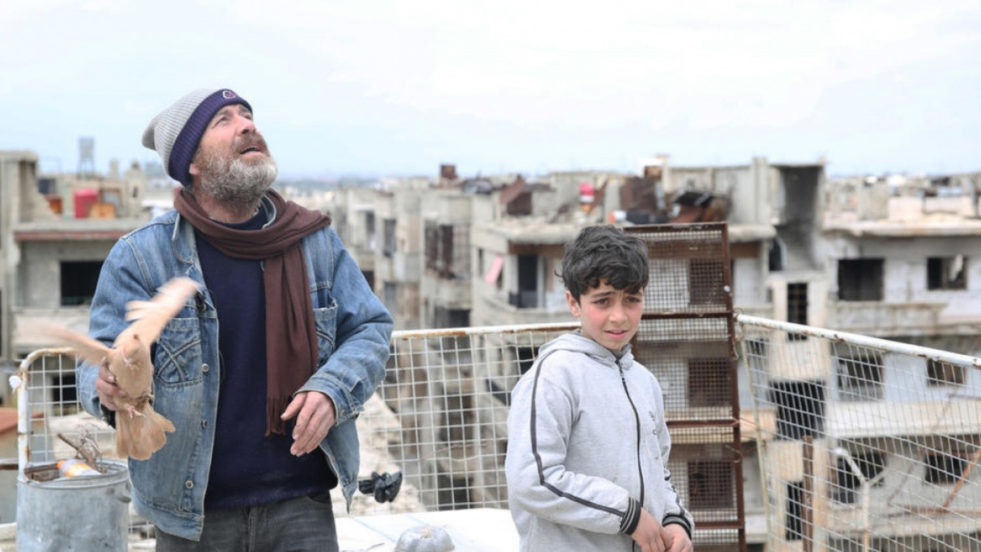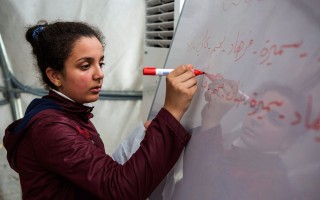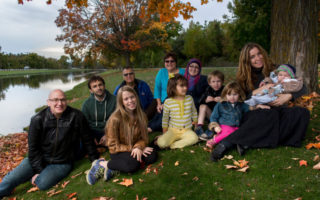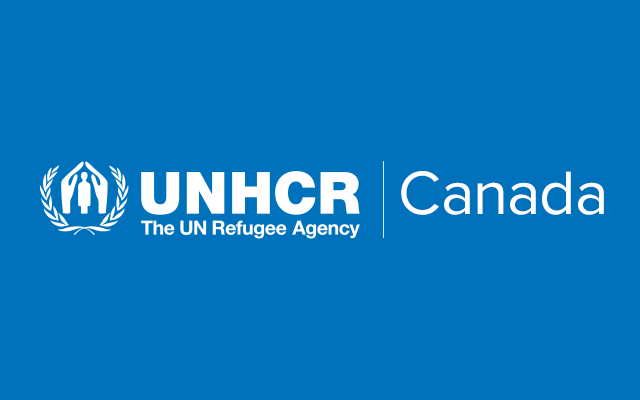
Twelve-year-old Abdelmalik helps his father, Jihad, call their flock of pigeons home on their rooftop in Homs, Syria. © UNHCR/Ola Kabalan
Displaced inside their country since 2012, a young family return home to find their old neighbourhood in ruins. Now they are striving to put their lives back together.
By Christopher Reardon in Homs, Syria
From the rooftop above his family’s flat, a brown-eyed boy looks out across a broken cityscape. In every direction, there is wreckage. Blocks upon blocks of war-torn ruin.
But Abdelmalik, 12, doesn’t focus on the destruction. He is gazing higher, towards a flock of nearly 40 pigeons circling overhead. Moments earlier they were here in their loft, before he let them out to stretch their wings.
“We’ve kept birds here since I was very young,” he says. “I like to play with them, especially the baby ones.”
Abdelmalik and his family are living in Al-Qusour, a section of Homs that was once a vibrant residential neighbourhood. His father, Jihad, 44, has lived here for decades, since he himself was a boy.
“All around there were explosions over our heads. We fled in only our clothes.”
But years of fierce fighting emptied this part of the city, and there are few signs of life here today. At most, half a dozen families on this block have dared to come back, out of more than 100 before the war.
In a way, it is a microcosm of Syria. Last year, about 1.4 million people returned home from other parts of the country and began wrestling with the challenges of starting over. But six million more remain displaced inside Syria.
Abdelmalik’s older brother, Abdelrahman, 15, recalls their escape from Homs in 2012. “It’s like we were homeless,” he says. “We were sleeping and all around there were explosions over our heads. We fled in only our clothes.”
First they made their way north to Hama, but their father struggled to find work there and rising rents kept forcing them to move from place to place.
“We lost three years of school,” says Abdelrahman. “Every time we started classes, I would have to leave because we had to move again.”
They returned to Homs Governorate around 2015, but their neighbourhood was still a combat zone, so they tried their luck in a rural area outside the city. Eventually, as the fighting moved elsewhere, Jihad was able to come back to their home and survey the damage.
“Imagine returning and finding nothing. No doors, no windows, not even a front door.”
“Imagine returning and finding nothing,” he says over a cup of coffee in their spartan living room. “No doors, no windows, not even a front door. We would sleep on foam mattresses. We had absolutely nothing.”
Slowly they are putting the pieces back together. With help from his sons, he cleared out the debris and set to work fixing the walls and ceilings. UNHCR, the UN Refugee Agency, sent a local partner – the Aoun Project for Relief and Development – to install doors and windows that keep the family safer and warmer.
A blacksmith and handyman by vocation, Jihad is itching to do more. “I’ll fix every one of these houses for you,” he says, gesturing with his calloused hands at the crumbling facades up and down his street. “Just give me the tools.”
But it’s unclear who would live there. The Al-Qusour area still lacks many essentials, like running water, reliable electricity and grocery stores.
Schools and teachers are also in short supply. Although Abdelmalik and his younger brother, Majid El Dine, aged nine, are back in school, Abdelrahman, already years behind, has been unable to continue his education.
After years of shelling, many buildings are heavily damaged or structurally unsound. Jihad cannot say when, or if, his neighbours will return. Not everyone shares his homing instinct.
Up on the roof, he and Abdelmalik watch their flock orbit the neighbourhood. Then Jihad holds out one arm and whistles.
It takes a few tries, but soon the birds cock their wings, change course and swoop down to their rooftop loft. Abdelmalik lures them inside with some old breadcrumbs and closes the latch.
They seem to be kindred spirits, these birds and their owners. As Jihad says, “You can never find a house better than the one you have.”
Originally published by UNHCR on 10 May 2019





